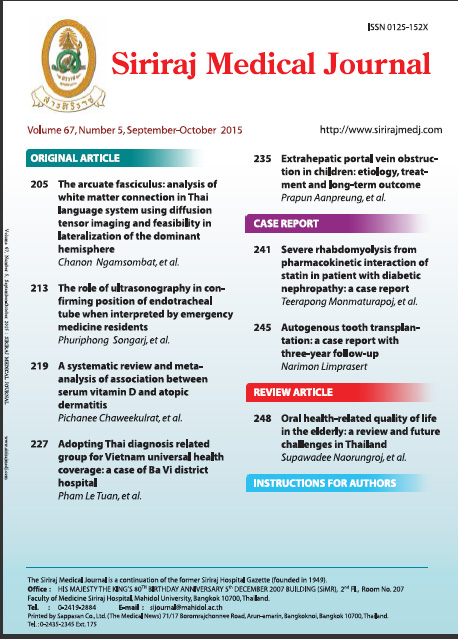A Systematic Review and Meta-analysis of Association between Serum Vitamin D and Atopic Dermatitis
Abstract
Objective: The relationship between vitamin D and atopic dermatitis remains controversial. Here, we systematically reviewed and meta-analyzed the association between serum 25-hydroxy vitamin D concentration (25(OH)D) and atopic dermatitis (AD), AD severity, and the benefits of oral vitamin D supplementation.
Methods: A total of 15 observational studies and 5 RCTs from 12 countries were included in this review. The effects of vitamin D deficiency or vitamin D level on AD and standardized AD severity score were performed using a random-effects model on 3 aspects: 1) serum vitamin D and risk of AD, 2) serum vitamin D level and severity of AD, and 3) the benefits of oral vitamin D supplementation on AD severity.
Results: The analysis showed serum 25(OH)D deficiency marginally increased the risk of AD (OR = 1.55, 95%CI = 0.94 - 2.55, p = 0.084). Low serum 25(OH)D was correlated with greater AD severity (r = -0.29, 95%CI = -0.504 to -0.048, p = 0.020), and oral vitamin D supplementation helped reduced AD severity score by 0.963 standard deviation (95%CI = 0.23 to 1.70, p = 0.011).
Conclusion: The association between serum 25(OH)D deficiency and risk of AD was still controversial. However, our meta-analysis suggested that higher serum 25(OH)D is associated with lower severity of AD. Moreover, oral vitamin D supplementation also helps to reduce AD severity.
Keywords: Atopic dermatitis, vitamin D, systematic review, meta-analysis
Downloads
Published
How to Cite
Issue
Section
License
Authors who publish with this journal agree to the following conditions:
Copyright Transfer
In submitting a manuscript, the authors acknowledge that the work will become the copyrighted property of Siriraj Medical Journal upon publication.
License
Articles are licensed under a Creative Commons Attribution-NonCommercial-NoDerivatives 4.0 International License (CC BY-NC-ND 4.0). This license allows for the sharing of the work for non-commercial purposes with proper attribution to the authors and the journal. However, it does not permit modifications or the creation of derivative works.
Sharing and Access
Authors are encouraged to share their article on their personal or institutional websites and through other non-commercial platforms. Doing so can increase readership and citations.











